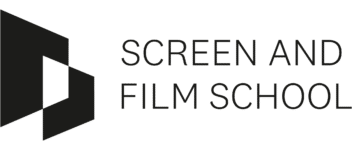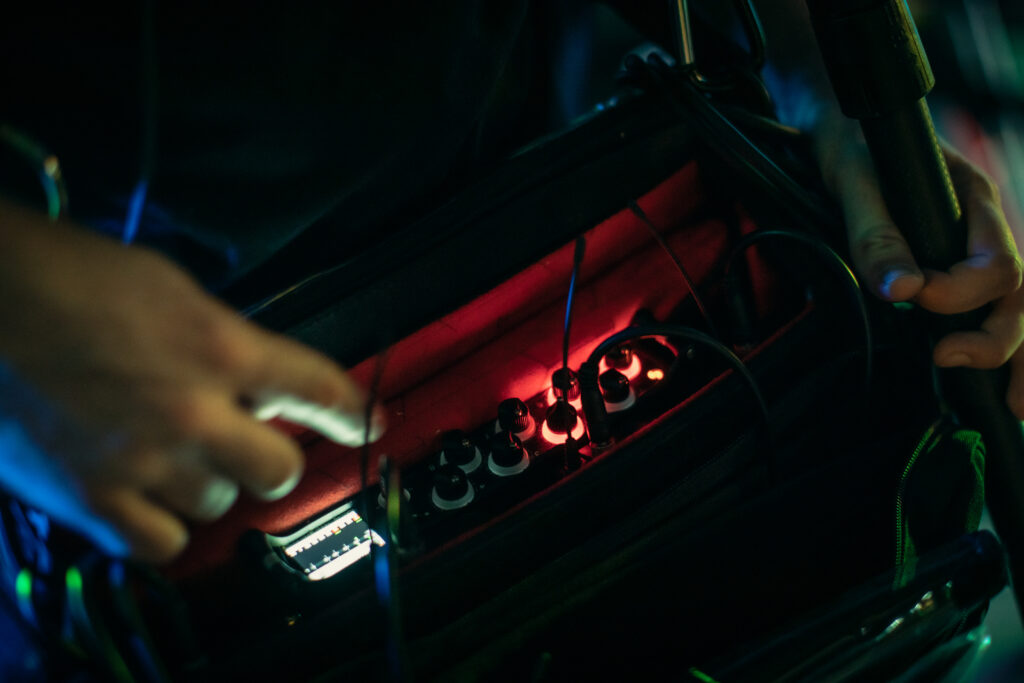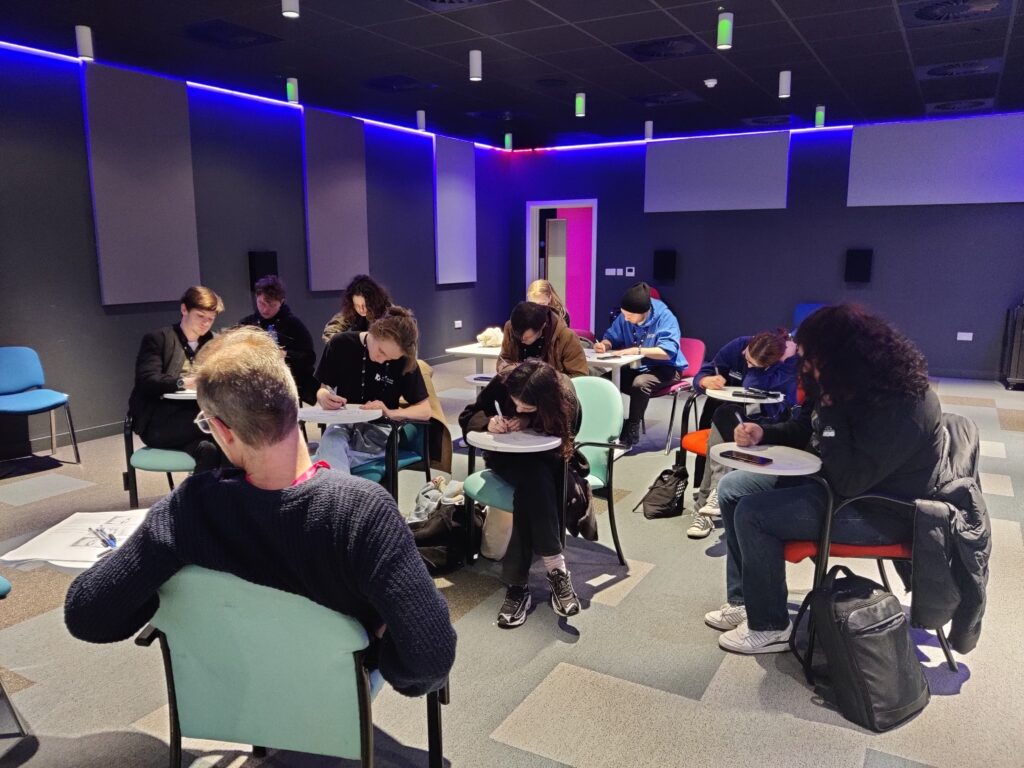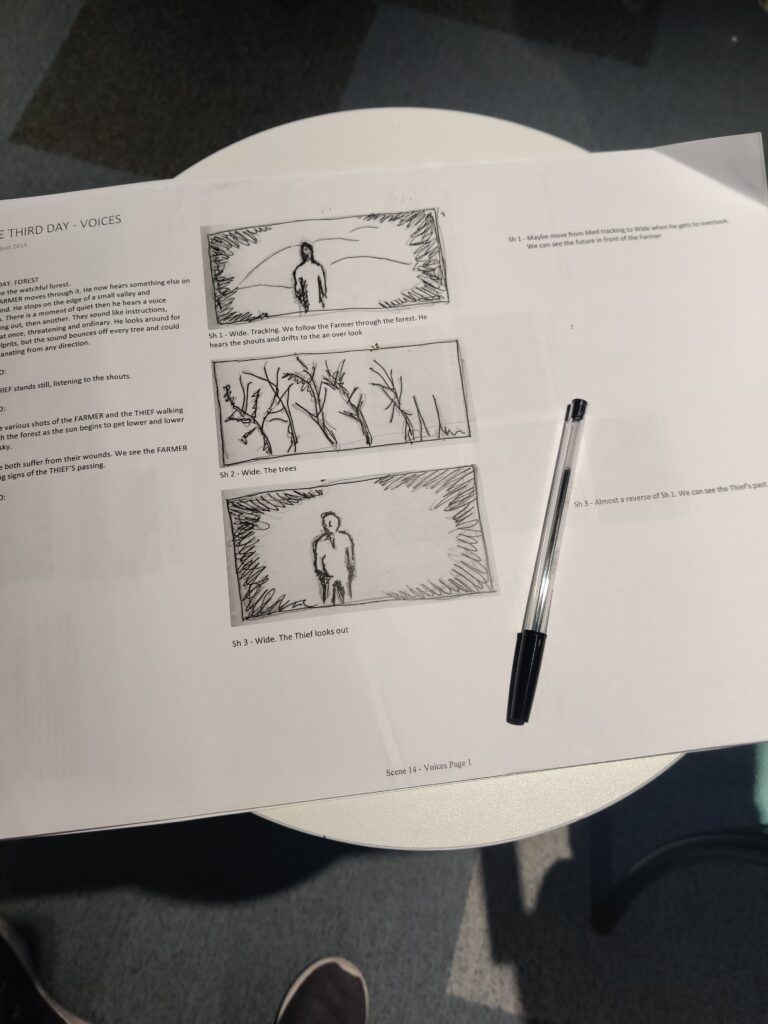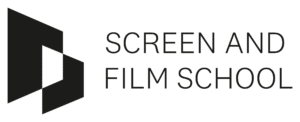A bumper industry recap at Screen and Film School Birmingham: Part 1
It’s been an extremely busy start to 2023 at Screen and Film School Birmingham and our specialist industry masterclasses have covered a variety of areas, such as sound design, pre-production, and film festival preparation. It has been such a bustling period that we are going to look back on all of our brilliant guests in two parts.
With that in mind, here is Part 1 of our industry recap and a focus on all of the masterclasses that have taken place at our Digbeth campus so far this year. Without further ado, first up is Spesh Maloney, a sound design specialist.
Spesh set out on the path of a musician before becoming a sound specialist in film, learning piano at a young age. He went on to study guitar at the Academy of Contemporary Music, where he discovered the world of recorded sound and audio production. This led him to a BA (Hons) in Digital Music at the University of Brighton, where one module in synchronised music and sound production changed his life.
Spesh was kind enough to answer the following questions during the masterclass:
What does your job entail?
My job mainly consists of getting videos and films sent over from directors and doing the sound mixes, often creating new sound files and shaping the narrative arc of a storyline. I also spend a lot of my working time cleaning audio up to make it sound crisp and clear.
How did you get involved with sound?
I got into sound and film by doing music – you’ll find a lot of sound designers enter the industry through a musical background. When I was at University, I did a term on music and sound for film, and I loved the way the worlds came together. I think that one without the other isn’t as interesting as with.
Who have you worked with?
The BBC is the biggest institution that I’ve worked with – and something like the Continuing Drama department, which is run by BBC studios. I work with the post-production supervisor to help designate roles for jobs. When I work with them, it’s usually to do something dramatic to a scene. Creating a sound world for a scene and then working closely with the director and the dubbing mixer.
What are the different elements of sound?
You can generally translate all of the elements of sound for film into three categories: direct sound or location sound (which can include voiceovers) which is anything that is intended to sound realistic. The second element is bringing all of that into post-production. The third category is creative sound design and creative post-production. This means that if direct sound or post-production haven’t quite done the job then you can begin to layer on top of it.
What is most useful to remember when recording sound?
When you’re recording, too quiet is better than too loud – you want it to exist in the middle. If you’re uncertain, then always trim down and you can amplify and compress at a later date.
Are there any overused techniques?
There is a real trend at the moment for ASMR (autonomous sensory meridian response). The trend will pass but it does seem to be overused at the moment.
Are there any underrated techniques?
The most important thing that anybody working with sound should concentrate on is the equaliser (EQ) – that is the nuts and bolts of everything. Within every sound there are frequencies, and an EQ can fix most problems.
What is your best piece of advice when mixing sound?
The main thing to remember when mixing sound, especially dialogue, is to use that dialogue as the base for everything else. Make sure it sounds clean, that the EQ is correct and that nothing is too loud or too quiet. Then build your mix around that. Once that is nailed, leave it alone and craft everything else around it.
Do you have some general advice for our young filmmakers?
Stick with people who you get on with – it is better to work with people who you like and are okay at what they do, over people who you don’t like that are exceptional!
Thanks to Spesh for those sound words of advice on all things…sound! Spesh encouraged our students to reach out to him if they had any questions, and he can be contacted through his website: Spesh Maloney – Film, TV & Multimedia Composer and Sound Design.
Next up, in mid-March, was award-winning filmmaker, Ben Cook. Ben joined us at the Film School to discuss all things pre-production, in particular storyboards. Ben is a documentary and fiction filmmaker, whose work has covered topics including mental illness, social housing, food security, the environment, drone warfare, women refugees and aids awareness. His most recent film about the Atuel River in Argentina has opened in cinemas in South America and instigated discussion there on the use and misuse of water sources. Ben is currently in pre-production for his feature film Shuck with members of The Film Liberation Project.
Ben started the masterclass by asking our students what they currently use storyboards for and why they use them. Their answers were as follows:
1. To have a visual of your shot list.
2. To use as a blueprint for your film.
3. To be able to communicate with your crew what the shot is.
Ben said that these three were all key reasons to storyboard, but they also all have their drawbacks and offered valuable advice on how to be adaptable:
1. You become too hyper-focused on recreating the storyboard rather than using it as a blueprint. Be flexible and agile when on set.
2. You created the storyboard before you had a location and now the shots don’t work in that space. Do test shots in the space before the shot or adapt.
3. You can’t always get your vision across in that format. Use different approaches and mediums too. Photographs or schematic maps.
Ben then set the task of storyboarding a dialogue scene between two people, a therapist and a client. Our students were given a storyboard template and ten minutes to draw this scene. Afterwards, students volunteered to show their storyboards without explaining them, so the rest of the group could say what they understood from the material. Following this, the students were able to ask their own questions to Ben, particularly about problem solving.
Q: I struggle with drawing perspective, what should I do to improve?
A: You don’t have to draw your storyboards. I use LensPick, an app that shows you what different lenses will look like and then you take a picture. Ask a friend to help block it out while you take them.
Q: I can only draw stick men, how do I progress?
A: Stick men are acceptable, as long as your crew can understand the shot and the rest of the information, then your storyboard has served its purpose. Alternatively, find someone who is great at drawing. Sit with them as you explain your shot list. But remember storyboards don’t have to be drawn. Technology can get you past that hurdle.
Q: Storyboarding isn’t for me – it’s too stressful. How can I take the stress out of it?
A: It doesn’t have to. You can use different ways of communicating your ideas and shots to your crew. Mood boards can help you do this in your early stages of pre-production. Pinterest is great for creating mood boards too.
Take a look at the trailer for Ben’s documentary Atuel here.
Thank to Ben and also to Spesh for their insightful words and their time. These top-level masterclasses are something that we aim to deliver to our students on a consistent basis and the students benefit hugely from having face time with talented filmmakers. Stay tuned for Part 2 from Screen and Film School Birmingham, coming up next week.
Are you interested in being a part of the new legacy at Screen and Film School Birmingham?
Sign up to one of our Open Days:
Find out more information on our courses by clicking below:
